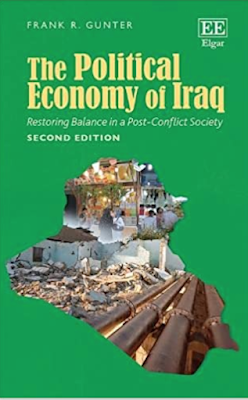Gunter, Frank, The Political Economy of Iraq, Restoring Balance in a Post-Conflict Society, Cheltenham, Northhampton: Edward Elgar, 2013
Books about Iraq’s economy are very rare and those that exist tend to talk about the past instead of the present. That’s what makes Professor Frank Gunter’s The Political Economy of Iraq, Restoring Balance in a Post-Conflict Society such a rarity. Even though it was published in 2013 its insight into nearly every bit of Iraq’s economy should make it a reference book for anyone interested in the topic.
Gunter’s first and most important point is that statistics about Iraq are almost always useless. In 2011 the World Bank ranked Iraq’s statistical capacity as tied with Sudan and Afghanistan at the very bottom of its list. That’s because basic numbers like the population and how many workers are employed in the government which dominates the economy are not available. This is due to politics. Iraq has not had a census for decades because the ruling parties don’t want to have one out of fear that their ethnosectarian group will be smaller than they claim. Similarly, there are no set numbers on public employees because there is so much corruption and dysfunction in the state. Trying to hide ghost employees which officials and the political parties use to steal money is one major reason why there are no firm figures. There’s also the informal economy which is very difficult to capture in statistics and the Iraqi government often lies about itself to make it look good. That means most numbers on Iraq are either guestimates or fiction.
Because the author deals with political economy it’s not just about trying to decipher the numbers on Iraq but he tries to explain how various systems work. For instance, Gunter writes that since consumers don’t pay for services which are supplied free by the state they are not considered by the government. Instead, decisions are made based upon politics and corruption. Projects and supplies are chosen based upon how it will increase the wealth and influence of the given ministry not how it will serve the people. Gunter doesn’t mention it but that also includes the political party that controls the ministry’s bureaucracy. A large portion of the budget for such a project will go to public employees via salaries and benefits. Materials are often bought from a business that has a relationship with ministry officials. Hiring is based upon such connections as well rather than competency. Maintaining this system is more important than the public receiving any benefits or service from the project. The population indirectly supports this process because surveys have shown they want services free of charge from the government so they don’t make demands for things like fees or taxes which would make the state responsive to them. People act upon incentives and in Iraq they are set up to keep up this corruption that only benefits the elite and the bureaucracy which get its cuts along the way.
Finally, if anyone wanted to understand the valuation of the dinar, Iraq’s transportation system or electrical and oil industry this would be the book to read. It breaks down each one and provides suggestions for how to improve them. Overall, those included passing an oil law to expand the most important business in the country, a legitimate anti-corruption strategy, reform regulations which are anti-business and trade, expand basic education for the population which is in decline, monetary reform, charge for water use, and federalism which would move money and resources out from Baghdad to the provinces. Iraq has been pushing many of these issues for years with little results again because the system is self-perpetuating with no reason to change. It shows that many of Iraq’s institutions have been resilient despite changes in government and even a U.S. invasion to the detriment of the nation.
Professor Gunter’s book is a must read for anyone that wants to understand Iraq’s current economy. It’s easy to read and has important insights into why Iraq is so dysfunctional. There are few books that have ever tackled this subject so it should be on everyone’s bookshelf who is serious about studying Iraq.
Link to all of Musings On Iraq’s book reviews listed by topic





No comments:
Post a Comment